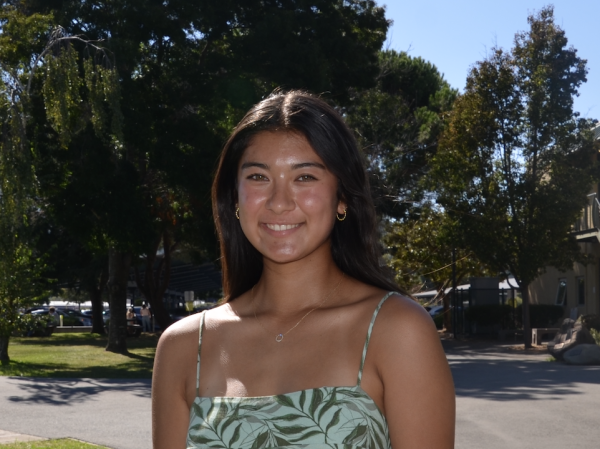According to U.S. News and World Reports, Marin is the sixth richest county in the country. With high property values and living costs, the community’s wealth can often shield residents from those who need extra assistance. The culture of high value and disconnect continues with high schoolers in the area as they push towards the highly esteemed schools that have become normalized to attend. Due to the disconnect with those in need, community service is done for the purpose of personal motives and resumes rather than genuine morals and to gain a better understanding of the broader world you are in outside of the bubble.
College counselor Stacy Colwell frequently sees the role community service plays in the college application process.
“I feel like a lot of parents really feel like kids can’t get into a school if they don’t have [community service on their application],” Colwell said. “I think the kids that are involved in it for a passionate reason made a much more conscious decision about where they’re going to volunteer and how much time they’re going to volunteer, which is more meaningful.”
While community service to many high school students may just be for the credit, Colwell thinks students should look at volunteering from a new perspective, not only to benefit their community but themselves as well.
“If you’re doing volunteer service, you really should be doing it [because you want to]. Not just to check a box or put certain hours on your application, but [instead] to think about what you can also get back from it,” Cowell said.
This sentiment underscores the importance of engaging in service that is meaningful and immersive rather than just fulfilling a requirement. A poll from the University of California, Los Angeles, found that roughly two-thirds, or 64 percent, of teens were engaged in community service. This large margin is positive but shows that it is an everyday activity and features on college applications. Elevating yourself as a student and community member is finding something that “makes you tick” that you truly feel passionate about and then involving yourself.

When students step out of this bubble and expose themselves to hands-on community service, the experience transforms them and the communities they serve for the better. Junior Ollie Weston, a part of the Marin charity group “National League of Young Men,” knows this first hand.
“I definitely feel when you’re more hands-on, it makes you feel better, in a way. It also just feels [like you’re] helping and really talking with people. Getting your hands dirty, you feel more proud [of your work],” Weston said.
Weston’s commitment to volunteering with Corte Madera’s REC Inc. Seals Basketball Team, a program for teens and adults with developmental disabilities, highlights the impact of genuine, immersive service. By actively engaging with the players, Weston has gained a full perspective of those living with disabilities.
“I heard some stories [from] these people with disabilities, and some of their experiences kind of opened my eyes, [giving me] greater exposure to some of the issues that they deal with in society. I wish [communities] were more inclusive to them, you know?” Weston said.
Freshman Isabel Acevedo echoes this statement, sharing her experience volunteering at The Cedars of Marin, an organization that offers living and independence programs to persons with intellectual and developmental disabilities.

“I’ve gotten to know the people really well throughout the years and have really heard their stories, and it’s had a really big impact [on me],” Acevedo said. “I think that it also makes you a better person. Just seeing what different lives that people can have and how big of an impact you can have on someone’s life by just doing a little deed.”
Cheryl White, the Co-Executive Director of The Cedars of Marin, has seen the effect of students finding a connection with the residents there. With housing in Ross and Novato offering four different day programs, The Cedars of Marin offers volunteer opportunities for students to talk face-to-face with residents and possibly provide a new perspective to those living with disabilities.

White, originally graduating from school to be a psychotherapist, got a job at a day program similar to Cedars’, where she really found a drive to help people. Within the community, she has made bonds with residents and gained stories that she says have changed her as a person. When asked if there were any stories worth sharing, White had one in particular of a woman named Nancy.
“After her day program, [she] would take walks through San Anselmo and go to the Ross Valley Fire Department,” White said. “Generations of firefighters know Nancy, and I was talking with the chief who said ‘You cannot imagine the meaning and lessons that Nancy has taught us at the fire department about being better people.’”
Within the first year of working at The Cedars of Marin, Nancy had told White that she had invited the firefighters to dinner. At first shocked, White then had to ask the resident chef to change the menu, and sure enough at 5 p.m., the firefighters came. The strong community built around Cedars has changed the outlook for many.
“People who come to volunteer at Cedars who may or may not have had a person in their life who has a developmental disability and may have preconceived notions about people with disabilities might make real connections,” White said.
White also added that from her experiences, a lot of the people who volunteer at first to fulfill service requirements, come back out of their own drive to see the residents again. A lot of the experiences created through community service, can translate into life lessons used for after a college application is due.
Former President George H.W. Bush once said “There could be no definition of a successful life that does not include service to others.” Despite whatever initial reasoning for starting community service, there can be a push for a more meaningful connection.





